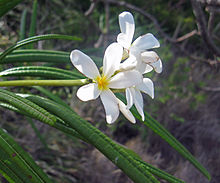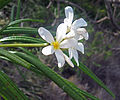Plumeria alba
Appearance
(Redirected from Nosegaytree)
| Plumeria alba | |
|---|---|

| |
| Scientific classification | |
| Kingdom: | Plantae |
| Clade: | Tracheophytes |
| Clade: | Angiosperms |
| Clade: | Eudicots |
| Clade: | Asterids |
| Order: | Gentianales |
| Family: | Apocynaceae |
| Genus: | Plumeria |
| Species: | P. alba
|
| Binomial name | |
| Plumeria alba | |
| Synonyms[3] | |
| |
Plumeria alba is a species of flowering plant in the genus Plumeria native to Puerto Rico and the Lesser Antilles in the Caribbean. It has been planted in tropical regions worldwide.
Common names
[edit]- Caterpillar tree
- Cagoda tree
- Pigeon wood
- Nosegay tree
- White frangipani
- Kath golap (Bengali: কাঠ গোলাপ)
- Champa (Bengali: চাঁপা)
- Frangipanier à fleurs blanches (French)[4]
- Lee La Wa Dee (Thai: ลีลาวดี)
- Châmpéi sâ (Khmer)[4]
- Hoa chăm pa (Vietnamese)
- Kamboja (Indonesian)
- Kalatsútsing putî (Tagalog)[5]
- Dok Champa (Lao: ດອກຈໍາປາ)
- Chafa (Marathi)
- Sudu araliya (Sinhala)
- Champo (Gujarati)
- الياسمين الهندي
Uses
[edit]P. alba is often cultivated as an ornamental plant. In Cambodia pagodas especially choose this shrub, with the flowers used in ritual offerings to the deities, they are sometimes used to make necklaces which decorate coffins.[4] In addition, the flowers are edible and eaten as fritters, while the heart of the wood is part of a traditional medical preparation taken as a vermifuge or as a laxative.
Gallery
[edit]-
Flowers
-
Illustration
-
Foliage with Pseudosphinx caterpillars
-
Plumeria alba flower, Bangalore, India
References
[edit]- ^ IUCN SSC Global Tree Specialist Group; Botanic Gardens Conservation International (BGCI) (2022). "Plumeria alba". IUCN Red List of Threatened Species. 2022: e.T208165050A208357728. doi:10.2305/IUCN.UK.2022-1.RLTS.T208165050A208357728.en. Retrieved 20 March 2023.
- ^ "Plumeria alba". International Plant Names Index (IPNI). Royal Botanic Gardens, Kew; Harvard University Herbaria & Libraries; Australian National Botanic Gardens. Retrieved 24 April 2009.
- ^ "The Plant List: A Working List of All Plant Species". Retrieved June 26, 2014.
- ^ a b c Dy Phon, Pauline (2000). Plants used in Cambodia. Phnom Penh: Chez l'auteur, printed by Imprimirie Olympic. OCLC 47148447.
- ^ "White Plumeria in Tagalog".
External links
[edit]Wikimedia Commons has media related to Plumeria alba.
Wikispecies has information related to Plumeria alba.
- National Tropical Botanical Garden Plant Database
- The Plants of Saint Lucia: Wild Flowering Plants Archived 2020-02-11 at the Wayback Machine
- Plumeria alba (White Frangipani), University of Florida





